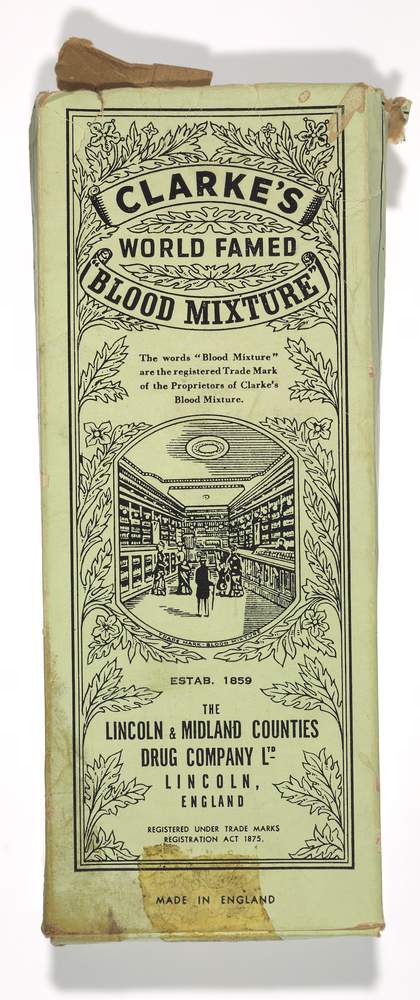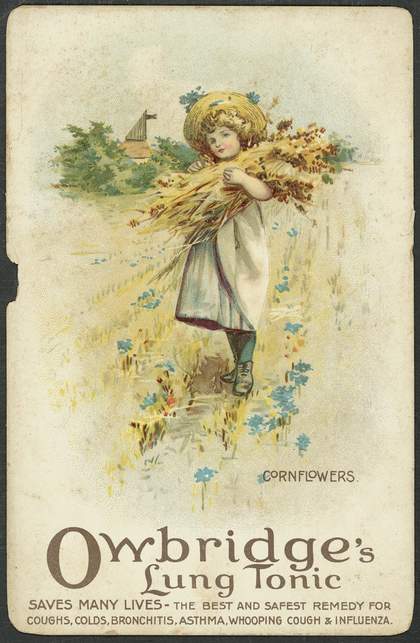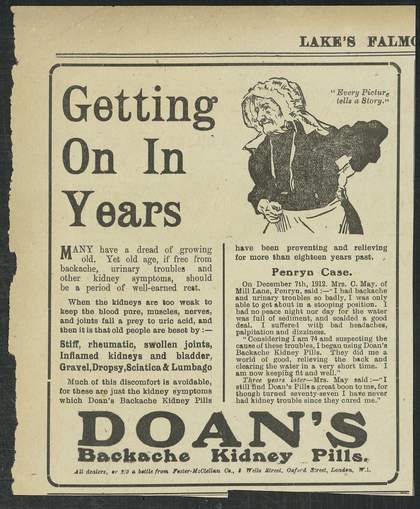
Packaging for Clarke's World-Famed Blood Mixture, c.1920s
I’ve always been interested in the artistry of remedies and the creative methods used in defence of a cure. My heritage is rural Indian, and by god we’re a superstitious bunch! We pray at the village snake shrine to reverse illnesses, to overcome a bad harvest or a bad marriage. As a child I was subjected to a series of dubious treatments to cure asthma and eczema. These included being flown to the Punjab and being held under the waters of the Golden Temple until I’d turned blue, or being subjected to large doses of chicken broth, a dark sickly concoction, as part of my daily breakfast. So I was intrigued to find in the Tate Archive a British Medical Association book that pulls the lid off cures for a variety of illnesses. Its sober title is Secret remedies, what they cost and what they contain, based on analyses made for the British Medical Association. The method of the authors is straightforward: to reveal the ailment and its vaunted cure and then to state the chemical composition of the medicine as a way of showing how the mix would hope-lessly fail the task of its intentions.

Victorian advertising card for Owbridge's Lung Tonic
One such medicine of great promise is Owbridge’s Lung Tonic, which is designed to cure ‘all affections of the chest, throat and lungs’. An accompanying pamphlet boasts that after one dose of the tonic, ‘the lungs and bronchial tubes will be fortified and invigorated to an extraordinary degree’. Not only that, a short final sentence states: ‘Cure is quite certain.’ I love the understated confidence, especially given that the BMA analysis shows the product contains, among other things, alcohol and chloroform. It’s hard to know how conscious the lung-afflicted patient would be to assess the state of their restoration.
Ingenious names for medicines make this red hardback an amusing exposé: Veno’s Lightning Cough Cure, Bell’s Fairy Cure, Anti-Rheumatic Pearls, Clarke’s World-Famed Blood Mixture. Figuroids is a peculiar sounding name, and the medicine performs a scientific miracle to enable weight loss: ‘Your extra fat simply passes from the adipose cells through their unbroken walls into the blood, and is there changed to water and carbon dioxide … In Nature nothing is destroyed.’ Maybe not for procuring gold, but for removing fat – transubstantiation is well and truly alive!
For alcoholics, there’s The Teetolia Treatment, which promises that within four days ‘the insistent craving for alcohol is absolutely destroyed – so much so, that even the thought of alcohol becomes nauseating’. Coza Powder goes a stage further; it is not only a cure for alcoholism, but a social panacea. Roll over Freud, Marx and Christ, because Coza Powder has ‘reconciled thousands of families, saved from shame and dishonour thousands of men and transformed them into sturdy citizens and capable business men’.

Newspaper advertisement for Doan's Backache Kidney Pills, 1918
Perhaps my favourite artistry with words is reserved for Doan’s Backache Kidney Pills. The pamphlet suggests the afflicted should consume at least 20 to 30 boxes of them. Why so many? Because ‘they will cure in the end if the patient perseveres. We are emphatic on this point because in kidney diseases patients are so easily discouraged. It is one of the symptoms of the disease.’ Ah, so that’s where I’m always going wrong: it’s not the medicine that’s at fault, but my lack of staying power. Henceforth I have been chastened, and I hope my reader is similarly prepared to shovel down spoonfuls of tincture and buckets of pills, till the island of good health is in sight.
For more information about the Tate Archive, see www.tate.org.uk/art/archive.
Daljit Nagra is a poet. He teaches poetry at Brunel University London and is currently poet-in-residence for Radio 4 and 4 Extra. His latest collection, British Museum, is published by Faber.
